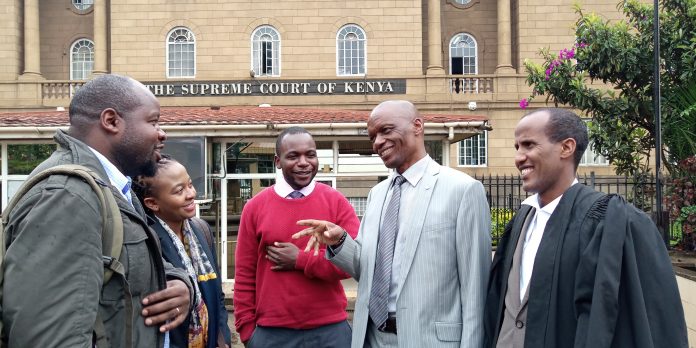Assets Recovery Agency senior assistant state counsel Adow Mohammed (right) Ministry of health public director director Kepha Ombacho with Kenya Tobacco control alliance officials Achieng Otieno, Lucy Kombe(the lady) and Maurice Mando (red sweater) outside Supreme court after BAT appeal was dismissed on Tuesday November 26, 2019./PHOTO BY S.A.N.
BY SAM ALFAN.
Leading a multinational cigarette and tobacco manufacturing firm (BAT) has been dealt a blow after the Supreme Court of Kenya directed it to comply with government regulations on cigarette packages to safeguard public health.
The five Supreme Court judges led by Chief Justice David Maraga, Deputy CJ Philomena Mwilu, Justices Smokin Wanjala, Jackton Ojwanga and Njoki Ndungu dismissed the appeal by BAT challenging the sanctions imposed by the state on cigarettes manufacturers and importers.
The Apex court upheld the decision of the Appellate Court, stating that the regulations must be complied with as they are legal and legitimate.
“The judgment of the court of appeal of Kenya at Nairobi in civil appeal No. 112 of 2016, is hereby upheld,” the Judges ruled.
The judges said they found no reason why they should delve into determination of how the superior court’s judgments should be executed or implemented.
The court did not interfere with court of finding that the solatium is not a tax. The appellate court was emphatic that the contribution is not a payment that goes towards the national revenue.
“We add that neither is it payment that goes to country revenue. It is not a payment that is made to be consolidated fund so as to be part of annual government budgeting and appropriation,” added judges.
The solatium is provided under statutes anchored with a clear framework on its purpose. The mere fact that a piece of legislation provides for the levying of a particular amount does not transform that the payment into a tax.
The Court of Appeal held that there was adequate consultation or public participation in the formulation of Tobacco Control regulations 2014 and that, except for regulations 1, 13(b) and 45, provisions are neither unconventional nor unlawful nor do they violate any right of the BAT.
In the matter, the Ministry of Health through a gazette notice on December 5, 2014 published the tobacco control regulations 2014 by a way of legal notice No. 169 (Legal Supplement No. 161). The regulations were made pursuant to section 53 of the Tobacco Control Act, 2007 and sought to regulate various aspects of the Tobacco sector in Kenya.
Section 53 of the Act gives powers of making regulations prescribing or prohibiting anything required by the Act to be prohibited or for the better carrying out of the objects of the Act.
BAT was aggrieved by the regulations and filed a petition at the high court challenging the lawfulness of the regulations and section 7,(2) 2015
The company lost the case and challenged before the appellate court which upheld high court decision.
Senior State Counsel Mohammed Adow told the court that tobacco use and consumption interferes with vital organs such as the brain, lungs, heart, liver and kidney and causes diseases, disability and death and it affects the health and lives of the present and future generations.
“Tobacco control and regulation is a global practice. Kenya being a respectable member of the international community and a party to WHO FCTC cannot be exceptional,” Adow submitted.
Mr Adow told Supreme Court the purpose of the regulation is to protect the global citizens, those who smoke and those who do not, from the harmful effects of tobacco consumption and use by informing them the effects of the same as per our bill of rights.







